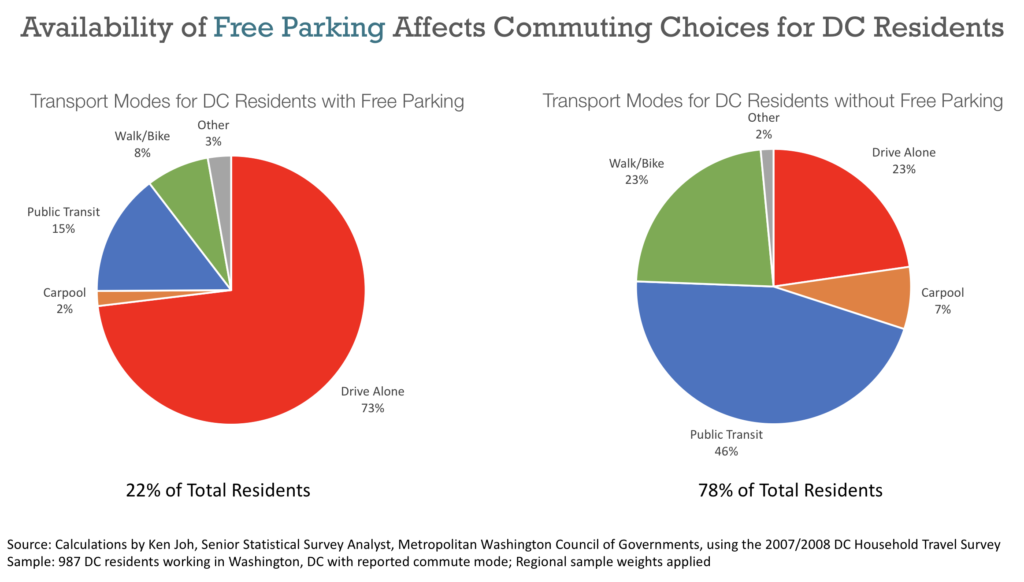For Immediate Release
April 7, 2020
Contact: Cheryl Cort, Coalition for Smarter Growth
T. 202-675-0016, www.smartergrowth.net/parkingcashout
Advocates Cheer DC Council’s
Unanimous Vote for Flexible Commuter Benefits
Employees will be eligible for walk,
bike, transit commute benefits equal to an offered parking benefit
The Coalition for Smarter Growth celebrated today the
success of its three-year campaign for flexible commuter benefits. “We are
thrilled that today the DC Council voted unanimously for the Transportation Benefits Equity Act (B23-148).
This new law will allow an employee who is offered a parking benefit by their
employer to use the equivalent value of the parking subsidy for a transit,
walk, or bike commute,” said Cheryl Cort, Policy Director for the Coalition for
Smarter Growth.
“This bill incentivizes more sustainable commuting as
commuters return to work on the other side of the current crisis. The
importance of bicycle transportation has emerged in the crisis as an
alternative to other modes, and this new law will help boost this option,” said
Cort. Once workers can return to their
daily routine, the new law will give many employees the opportunity to exchange
a parking space for a bike (or walk or transit) commute. This could push DC’s
current 18% walk and bike to work rate even higher, helping to reduce traffic
congestion, pollution, and crashes.
“We have worked on this issue for a number of years, with
dozens of meetings, outreach to the community, and extensive negotiations. The
final legislation involved many compromises. However, the core of the bill is
intact, and will start making a difference with most employers who offer
subsidized parking,” said Cort.
The Transportation Benefits Equity Act requires employers
who provide free or subsidized parking to employees to offer those same
employees alternatives that include:
- Employer-paid transit benefits;
- Taxable cash for employees who walk, bicycle, or
ride in a carpool to work, or who take transit (where cash would make up any
difference between the value of the parking and transit cost);
- Increased employer contribution to an employee’s
healthcare benefit;
Employers also have the option to:
- Develop a Transportation Demand Management (TDM)
plan to reduce vehicle commute trips toward the moveDC goal of 25% or less of
employees’ commute trips made by car or taxi (assisted by and approved by DC
Department of Transportation);
- Pay a sizable Clean Air Compliance fee to
support TDM measures for each parking benefit offered;
- Cease subsidized parking.
The law includes the following exemptions:
- Employers that currently own the parking used
for employees are exempt from this law.
- Existing leased parking: if an employer has an
existing lease for parking provided to employees, the employer must comply with
the new rules at the end of the current lease.
- Employers that do not provide subsidized parking
are exempt.
- Employers with 20 or fewer employees are exempt.
One of the largest compromises given to employers was the
full exclusion of currently owned parking. This means that essentially all
major institutions, like universities, are likely to be exempt. While some of
these institutions also lease parking, the bill exempts them if they are
running shuttles to leased parking lots half a mile or more away, or if they
have a Campus Plan with a Transportation Demand Management (TDM) Plan already
approved by DC Department of Transportation.
“The bill will provide flexible commute benefits to many downtown workers, likely reducing rush hour traffic. This can reduce congestion, speed up buses, cut pollution, and even reduce crashes,” said Cort. “It will keep DC in the forefront of cities implementing more sustainable transportation.”
###
Photo credit: Elvert Barnes, Flickr




